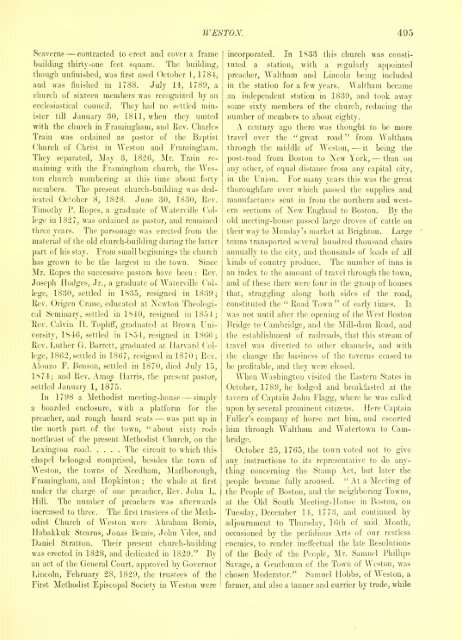History of Middlesex County, Massachusetts - citizen hylbom blog
History of Middlesex County, Massachusetts - citizen hylbom blog
History of Middlesex County, Massachusetts - citizen hylbom blog
You also want an ePaper? Increase the reach of your titles
YUMPU automatically turns print PDFs into web optimized ePapers that Google loves.
Seaverns — contracted to erect and cover a frame<br />
building thirty-one feet square. The building,<br />
though unfinished, was first used October 1,178-i,<br />
and was finished in 1788. July 14, 1789, a<br />
church <strong>of</strong> sixteen members was recognized by an<br />
ecclesiastical council. They had no settled min-<br />
ister till January 30, 1811, when they united<br />
with the church in Framingliam, and Rev. Charles<br />
Train was ordained as pastor <strong>of</strong> the Baptist<br />
Church <strong>of</strong> Christ in Weston and Framingliam.<br />
They separated. May 3, 18:i6, Mr. Train remaining<br />
with the Framingham church, the Wes-<br />
ton church numbering at this time about forty<br />
members. The present church-building was ded-<br />
icated October 8, 1828. June 30, 1830, Rev.<br />
Timothy P. Ropes, a graduate <strong>of</strong> Waterville Col-<br />
lege in 1827, was ordained as pastor, and remained<br />
three years. The parsonage was erected from the<br />
material <strong>of</strong> the old church-building during the latter<br />
part <strong>of</strong> his stay. From small beginnings the church<br />
has grown to be the largest in the town. Since<br />
Mr. Ropes the successive pastors have been : Rev.<br />
Joseph Hodges, Jr., a graduate <strong>of</strong> Waterville Col-<br />
lege, 1830, "settled in 1835, resigned in 1839;<br />
Eev. Origen Crane, educated at Newton Theological<br />
Seminary, settled in 1840, resigned in 1854;<br />
Rev. Calvin H. Topliff, graduated at Brown University,<br />
1846, settled in 1854, resigned in 1866;<br />
Rev. Luther G. Barrett, graduated at Harvard Col-<br />
lege, 1862, settled in 1867, resigned in 1870 ;<br />
Rev.<br />
Alonzo F. Benson, settled in 1870, died July 15,<br />
1874; and Rev. Amos Harris, the present pastor,<br />
settled January 1, 1873.<br />
In 1798 a Methodist meeting-house — simjjly<br />
a boarded enclosure, with a platform for the<br />
preacher, and rough board seats — was put up in<br />
the north part <strong>of</strong> the town, "about si.'cty rods<br />
northeast <strong>of</strong> the present ilethodist Church, on the<br />
Lexington road The circuit to which this<br />
chapel belonged comprised, besides the town <strong>of</strong><br />
Weston, the towns <strong>of</strong> Needham, Marlborough,<br />
Framingham, and Hopkinton ; the whole at first<br />
under the charge <strong>of</strong> one preacher, Rev. John L.<br />
Hill. The number <strong>of</strong> preachers was afterwards<br />
increased to three. The first trustees <strong>of</strong> the Meth-<br />
odist Church <strong>of</strong> Weston were Abraham Bemis,<br />
Habakkuk Stearns, Jonas Bemis, John Yiles, and<br />
Daniel Stratton. Their present church-building<br />
was erected in 1828, and dedicated in 1829." By<br />
an act <strong>of</strong> the General Court, approved by Governor<br />
Lincoln, February 28, 1829, the trustees <strong>of</strong> the<br />
495<br />
incorporated. In 1833 this church was consti-<br />
tuted a station, with a regularly appointed<br />
preacher, Waltham and Lincoln being included<br />
in the station for a few years. Waltham became<br />
an independent station in 1839, and took away<br />
some sixty members <strong>of</strong> the church, reducing the<br />
number <strong>of</strong> members to about eighty.<br />
A century ago there was thought to be more<br />
travel over the " great road " from Waltham<br />
through the middle <strong>of</strong> Weston, — it being the<br />
post-road from Boston to New York, — than on<br />
any other, <strong>of</strong> equal distance from any capital city,<br />
in the Union. For many years this was the great<br />
thoroughfare over which passed the supplies and<br />
manufactures sent in from the northern and west-<br />
ern sections <strong>of</strong> New England to Boston. By the<br />
old meeting-house passed large droves <strong>of</strong> cattle on<br />
their way to Monday's market at Brighton. Large<br />
teams transported several hundred thousand chairs<br />
annually to the city, and thousands <strong>of</strong> loads <strong>of</strong> all<br />
kinds <strong>of</strong> country produce. The number <strong>of</strong> iims is<br />
an index to the amount <strong>of</strong> travel through the town,<br />
and <strong>of</strong> these there were four in the grouj) <strong>of</strong> houses<br />
that, straggling along both sides <strong>of</strong> the road,<br />
constituted the " Road Town " <strong>of</strong> early times. It<br />
was not until after the opening <strong>of</strong> the West Boston<br />
Bridge to Cambridge, and the Mill-dam Road, and<br />
the establishment <strong>of</strong> railroads, that this stream <strong>of</strong><br />
travel was diverted to other channels, and with<br />
the change the business <strong>of</strong> the taverns ceased to<br />
be pr<strong>of</strong>itable, and they were closed.<br />
When Washington visited the Eastern States in<br />
October, 1789, he lodged and breakfasted at the<br />
tavern <strong>of</strong> Captain John Flagg, where he was called<br />
upon by several prominent <strong>citizen</strong>s. Here Captain<br />
Fuller's company <strong>of</strong> horse met him, and escorted<br />
him through Waltham and Watertown to Cam-<br />
bridge.<br />
October 25, 1765, the town voted not to give<br />
any instructions to its representative to do any-<br />
thing concerning the Stamp Act, but later the<br />
people became fully aroused. " At a Meeting <strong>of</strong><br />
the People <strong>of</strong> Boston, and the neighboring Towns,<br />
at the Old South Meeting-House in Boston, on<br />
Tuesday, December 14, 1773, and continued by<br />
adjournment to Thursday, 16th <strong>of</strong> said Month,<br />
occasioned by the perfidious Arts <strong>of</strong> our restless<br />
enemies, to render ineffectual the late Resolutions<br />
<strong>of</strong> the Body <strong>of</strong> the People, Mr. Samuel Phillips<br />
Savage,' a Gentleman <strong>of</strong> the Town <strong>of</strong> Weston, was<br />
chosen iModerator." Samuel Hobbs, <strong>of</strong> Weston, a<br />
First Methodist Episcopal Society in Weston were farmer, and also a tanner and currier by trade, while

















